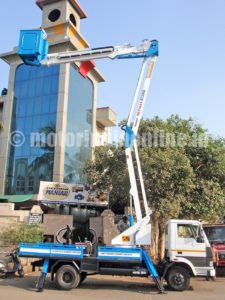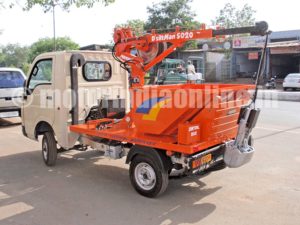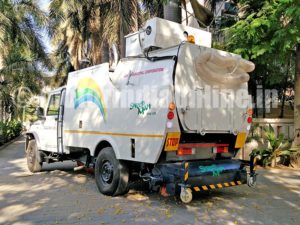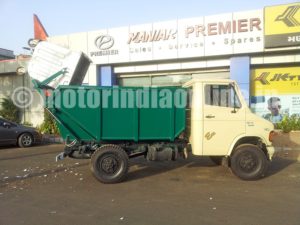Maniar & Co., a prominent manufacturer of waste handling equipment, mobile cranes and hydraulic access platforms, will soon be opening a new manufacturing unit in Dholka, some 40 km away from its current facility at Rakhial in Ahmedabad. The new plant will stand testimony to Maniar’s seven decades of precise engineering for which its products are known for their robust construction, user-friendly operation, simple maintenance and excellent performance.
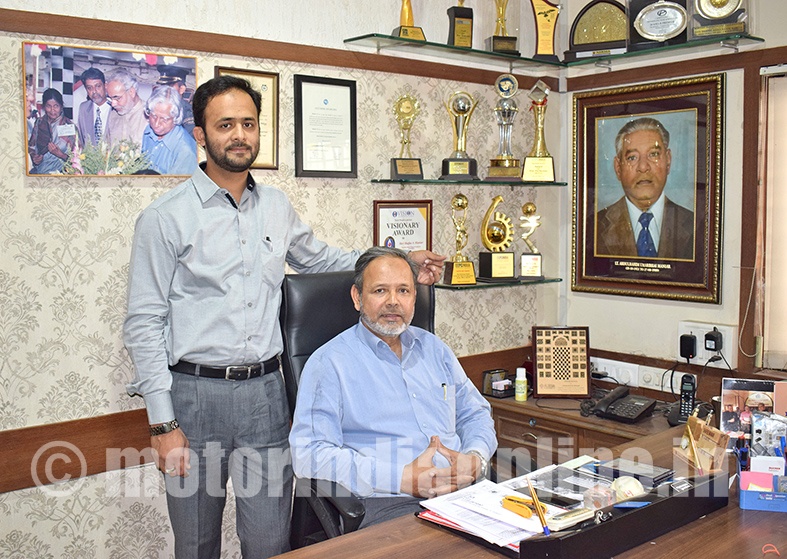
However, the skill and precision that people are acknowledging today, have come from years’ of knowhow. Said Mr. Abdulgani Manaiar, Director, Maniar & Co.: “My grandfather, Mr. Maniar Abdul Rahim, started a small fabrication shop in 1946 and started manufacturing handcarts. In those days handcarts – which are a source of livelihood for the poor and downtrodden even today – were made of wooden wheels. He had observed people facing difficulty since not all wheels were in proper circular shape. He saw an opportunity there and found some old tyres available in the market, and he introduced those old pneumatic tyres in the handcarts. He explained its advantages to the poor and needy and initially offered them on daily rental.”
Later Maniar Abdul Rahim extended the idea into making bullock carts. The wooden tyres were replaced with old jeep tyres. “Even there my grandfather actively got involved and explained the skeptics that it will lead to less impact on animals and yield production. The results later encouraged him to manufacture complete carts,” revealed Abdulgani.
Initial success help build trust of Maniar & Co. as fabricators, and it was in the late 1960s that the company started manufacturing cargo bodies also known as trolleys, on tractors. The director reminisced: “Some dealers imported Massey tractors in Gujarat, and when my grandfather designed a few cargo bodies or trolleys on them it became an instant hit and became a norm that a Massey tractor has to be fitted with Maniar trolleys”.
It was in the late 70’s when Mr. Shafee Maniar, Group President, and Mr. Iqbal Maniar, Vice President, (sons of Mr. Maniar Abdul Rahim), joined the company that other avenues were explored. “The new generation that time found a niche in solid waste management and used the company’s expertise of trolley to make hand equipment on tractor trolleys, unlike on big trucks that were popular in the West. It picked up momentum as most of the gram panchayats and municipal corporations owned tractors,” informed the Director.
As modernization happened and gram panchayats got bigger a lot of them migrated from buying a tractor to three-wheeled and 4-wheeled small commercial vehicles. “In 2005, about 17 people died within just a year, which put a lot of stress on the Ahmedabad Municipal Corporation to act for man-less mechanized waste collection solutions. We designed a grab bucket D’silting machine in 2005 and showcased it before the Municipal Commissioner. They liked our confidence, design and we got an order of three vehicles on Piaggio Apé 3-wheeler. That’s when our journey began and we have not looked back after that,” recalled Mr. Maniar.
The main benefits of the grab bucket machine are that they can go to the depth of the silt chamber and remove the deposited/residue silt. Contrary to a human sewer worker who has limitation of carrying capacity a machine can load anything in several attempts. “If a person goes inside the chambers, sometimes the material is so heavy that he cannot lift it. With our machine, it is now possible to lift/carry anything. The silt is collected in the waste bin provided in the chassis, so there is no re-handling of the garbage. The machine also provides dignity to the operator who is not looked down upon as a mere sewer worker.
Application engineering
Today, Maniar manufacturers equipment used for day-to-day waste, i.e., dry or wet garbage, refuse from household, manufacturing, bin lifter, high rise garbage tipper, refuse compactor, D’siltman, multi-purpose high pressure sewer jetting machine, etc.
Prominent innovations have also grabbed the attention of the vehicle OEMs. Citing one such example, the Director beamed: “We also build applications for Mahindra & Mahindra, Ashok Leyland and Tata Motors, as we help them design prototypes on special applications. As for Tata Motors we designed the elevated (Hydraulic Access) platform for street light maintenance, skip lifter and desilting grab bucket when they launched Tata Ace in the market. Since our equipment are hydraulically-operated, we were not using any separate power packs and take the power from the engine, designed the bracket and everything for mounting the pump with the engine. Using the Tata Ace’s Power Take Off to work to our advantage was our success.”
To maintain the robustness of the equipment of these products, most of Maniar’s equipments are made of Mild Steel (MS) “Only some others like Hydraulic Access Platforms reaching heights ranging from 9 m to 42 m are made from special steel,” told Maniar.
Undertaking all the modification and application designing requires awareness of overall GVW and compliance to RTO rules and norms. Axle load is taken into consideration, and length and height of the equipment closely measured. “We ensure validation of the application made and conduct an in-house testing which is approximately 1.5 times more than the required capacity. We also conduct structural strength and physical checks,” he added.
Giving us a rough idea about the volumes Maniar can undertake, Mr. Abdulgani stated: “Depending on the application we can change and vary our production from 50-60 units per month to 1000 units year. We have in house designing team that is in sync with client’s requirement. We prepare a 2D and 3D drawings, before the actual process starts in the workshop.”
Having established its competencies with various equipment and on various vehicle platforms, Maniar is looking to explore different applications. “We would want to get into material handling cranes, precisely knuckle boom cranes mounted on the trucks and construction tippers and hopefully should be ready with a prototype in couple of years”, concluded Mr. Maniar.
